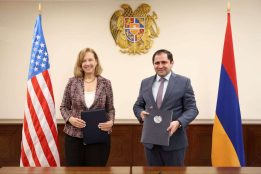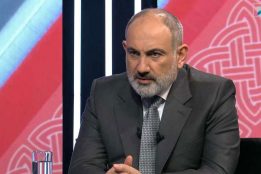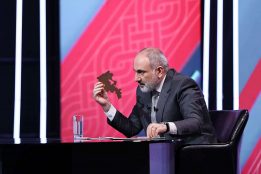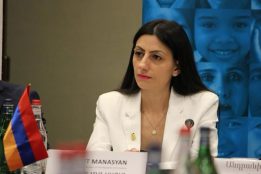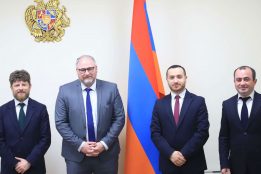
EURASIANET.org published Shahin Abbasov’s recent article on online freedom and shadow pressure in Azerbaijan.
Shahin Abbasov is a freelance reporter based in Baku.
Civil society activists in Azerbaijan are trying to push back against government efforts to restrict space for public debate. And they’re hoping a recent global Internet forum in Baku will expand international support for their cause.
The United Nation’s Internet Governance Forum, held in the Azerbaijani capital November 6-9, brought together more than 1,500 government officials, business executives, international organization representatives and civil-society activists from more than 100 countries. They discussed a wide variety of web-related issues, including Internet security, copyright laws and online eavesdropping.
In the coming weeks and months, rights activists in Azerbaijan hope the forum will prove a catalyst for broader international discussion about what they contend are government policies designed to stifle free speech. “If not for the IGF (Internet Governance Forum), we would not be able to attract so much international attention to problems with Internet-freedom in Azerbaijan,” said Rasul Jafarov, the director of the Baku-based Human Rights Club, part of the Expression Online Initiative, a non-governmental coalition.
The Internet emerged in 2009 as a new front in an ongoing free-speech battle, following theimprisonment of two video bloggers who posted a clip online that portrayed President Ilham Aliyev as a donkey. Over the past year or so, authorities have struggled to contain flash-protests whipped up via the social network Facebook. In a report distributed at the Forum, the Expression Online Initiative ranked the country as “partly free.”
While the Azerbaijani government may not block access to websites or social networks, noted Jafarov, “there is a serious problem with content regulation and [governmental] monitoring of email correspondence, social-network content and websites.”
Such “shadow” pressure prompts many Azerbaijanis to censor themselves online, he continued. “They are afraid to post critical stuff online [so as] not to be summoned to the Ministry of National Security and have other problems,” he said.
Media lawyer Alasgar Mammadli, a board member of the watchdog Azerbaijan Internet Forum, agreed. “People are afraid even to ‘like’ a cartoon about the president posted on Facebook,” Mammadli said. “The right to host the IGF does not mean that the country has a free Internet.”
Authorities defend their record by emphasizing quantity over quality when it comes to the Internet.
In an official letter to the Forum, President Aliyev argued that since 65 percent of the country’s 9.16 million citizens were online, Azerbaijan’s approach toward the Internet should be deemed free. Aliyev, writing in general terms, also credited the “the global network” for encouraging “freedom of speech on the Internet, the widening of social networks, [and] ensuring the open and transparent activity of government.”
At the forum, Communications and Information Technologies Minister Ali Abbasov said the government plans to spend over $500 million installing fiber-optic cables and satellite communications.
Both Jafarov and Mammadli acknowledged that the government has made progress in widening Internet access: prices have fallen significantly – from about 500 manats ($700) per month for unlimited, high-speed access in 2008 to about 10 manats ($12) today. But expanded web access should not be conflated with freer speech, they added.
Forum participants from the European Union and elsewhere tended to agree with civil society activists. At a November 7 news conference, European Commission Vice-President Neelie Kroes took Azerbaijan to task, citing the Azerbaijani public’s fear of speaking out freely online. Free speech and fear are incompatible, she indicated. “It is not a democracy, but an imitation,” Kroes said.
Senior presidential aide Elnur Aslanov dismissed Kroes’ criticism as “biased,” in comments distributed by the 1news.az website.
Kroes also called for the release of five Azerbaijanis currently in prison (Nijat Aliyev, Faramaz Allahverdiyev, Vugar Gonagov, Zaur Guliyev and Taleh Hasmammadov) on charges related, or claimed to be related, to their online activities. Separate calls for the release of the five were issued by Council of Europe Commissioner on Human Rights Nils Muižnieks and the OSCE’s Media Freedom Representative Dunja Mijatović. The government did not respond directly to the calls. Alsanov maintained that Azerbaijanis are not persecuted for expression of their opinions online.
On November 9, Ryan Heath, an aide to Kroes, alleged that someone had hacked into his laptop during the Forum. “It is consistent with the observations that have been made by [the European Commission] in connection with the freedom of the Internet in Azerbaijan,” Heath said about the episode during an interview with Radio Azadlig, the Azeri-language service of Radio Free Europe/Radio Liberty. No information was stolen, and he did not identify a possible perpetrator.
A spokesperson for the Ministry of Communications said the ministry had “heard about” Heath’s complaint, but did “not have any information about it.”
Jafarov and other Azerbaijani activists say European officials need to keep a close eye on Azerbaijan’s Internet situation, and to speak out when they notice government overreaching. “Otherwise, nothing will change,” Jafarov said.

















